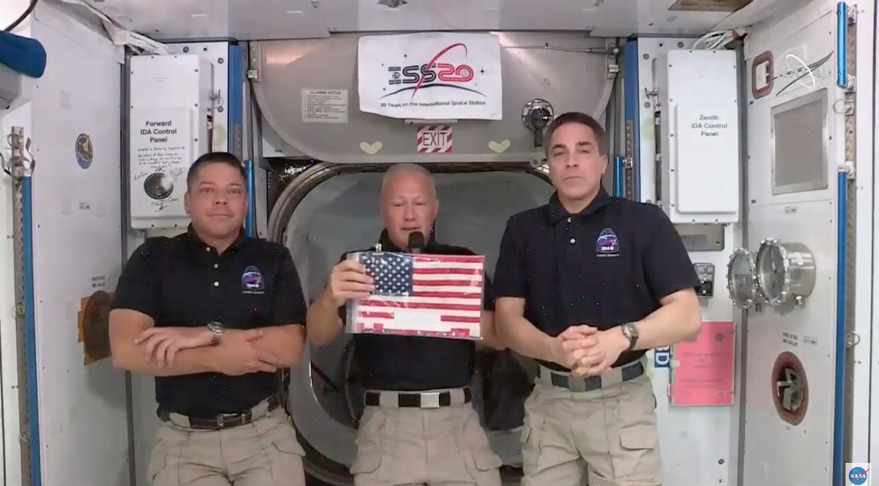
WASHINGTON — After making history on the first crewed flight of an orbital spacecraft launched from the United States in nearly nine years, two NASA astronauts are settling in on the International Space Station.
Astronauts Bob Behnken and Doug Hurley arrived at the ISS May 31, 19 hours after the Crew Dragon spacecraft they were on launched from the Kennedy Space Center. They will remain on the station for up to four months, joining the station’s crew of NASA astronaut Chris Cassidy and Roscosmos cosmonauts Anatoly Ivanishin and Ivan Vagner.
While Behnken and Hurley trained primarily to test SpaceX’s commercial crew spacecraft so that NASA can certify it for use on more routine missions, the shortfall in crew on the ISS mean the two will also be spending time helping out with station operations.
That work has already started, Cassidy said in a June 1 media event. “Today is day one, and they’re hitting the ground running, unloading the vehicle. We’ve got HTV right at our feet and we’ll be working in there in very short order.”
The H-2 Transfer Vehicle, or HTV, is a Japanese cargo spacecraft that launched to the ISS May 20 and was berthed to the station five days later. It carried several tons of cargo for the station.
The HTV also brought to the station a final set of new lithium-ion batteries for the station’s power system, whose installation requires a set of spacewalks. Both Behnken and Cassidy have spacewalk experience, and NASA is considering having them perform those spacewalks, or EVAs, in the next several weeks.
“That’s going to take somewhere on the order of four to five EVAs to install those. At this point, we are looking at all options that could allow us to do those EVAs while we have Bob and Doug on board,” Kenny Todd, NASA deputy ISS program manager, said at a May 31 press conference.
How long Behnken and Hurley will remain on the station is an open question. NASA officials say several factors go into that assessment, including the health of the Crew Dragon spacecraft as well as the readiness of the next such spacecraft, which NASA currently plans to launch Aug. 30 on a mission called Crew-1 with four astronauts from NASA and the Japanese space agency JAXA on board.
Steve Stich, deputy program manager of the commercial crew program, said at the May 31 briefing that they’ll be watching the health of the solar arrays on the Crew Dragon in particular, looking for any degradation in their performance. Neither NASA nor SpaceX have explained why those solar panels appear to be more sensitive than those used on other spacecraft, or the station itself.
Stich said they will power on the Crew Dragon spacecraft weekly to test its solar arrays. “It’ll probably take a few weeks to get trending on that,” he said. “In a month or so, we’ll be able to make a decision as to how long to keep this vehicle in orbit.”
Behnken acknowledged that uncertainty during the June 1 media event. “Several recent crews have had a little bit more uncertainty than we’ve had historically for how long their mission duration was going to be,” he said, referring to NASA decisions to extend the stays of some individual astronauts, driven in part by commercial crew delays. “Doug and I have maybe the most uncertainty, because it could be relatively short or we could potentially double or triple, maybe, what was originally expected for us just a few short months ago.”
One ceremonial thing the Demo-2 astronauts have done is “capture the flag.” The final shuttle mission, STS-135, left behind on the station a small American flag that also flew on the first shuttle mission, STS-1 in 1981. The flag was to remain on the station until the next American crewed spacecraft arrived.
“Chris had it right on the hatch where we left it nine years ago,” said Hurley, who was part of the STS-135 crew. He then displayed the flag, to which he said Cassidy added a note: “Do not forget to take with Crew Dragon.”
“You can bet we will take it with us when we depart back to Earth,” Hurley said. “We are lucky enough to be able to take it home with us, and that will be our plan here in a month or two or three or four.”
"work" - Google News
June 02, 2020 at 06:36PM
https://ift.tt/3eFkglh
Demo-2 astronauts get to work on ISS - SpaceNews
"work" - Google News
https://ift.tt/3bUEaYA
Bagikan Berita Ini














0 Response to "Demo-2 astronauts get to work on ISS - SpaceNews"
Post a Comment